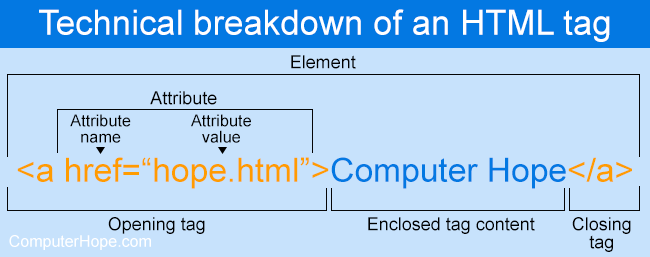Tag
A tag may refer to any of the following:
1. With HTML (hypertext markup language), XML (extensible markup language), and other markup languages, a tag is an element inserted in documents or files that changes the look of content or performs an action. Below is an HTML element (container tag) with an open tag (start tag) showing the name and attribute, and a close tag (end tag) showing a forward slash and open tag name.

Each tag is contained between less than and greater than angle brackets, and everything between the opening and closing tag is displayed or affected by the tag. In the example above, the <a> tag creates a link called "Computer Hope," pointing to the hope.html file.
For tags with no closing tag, like the <img> tag, it's best practice to end the tag with a forward slash, as shown below.
<img src="https://www.computerhope.com/logo.gif"/>

2. A tag is a short (usually one word) description of an HTML object or link. These tags are often placed in a tag cloud (weighted list or word cloud) to show popular website or blog words and help visitors find interesting information.
The picture shows a tag cloud of the text on this page that was generated using online software.
3. With social media, a tag or tagging someone describes linking a person to a related photo, video, or article. Tagging is done because that person may appear in the photo or video or because you want to draw someone's attention to a post.
4. A tag is a memory that acts as an index for L2 (Level 2) cache.
5. With gaming, a tag describes the player or NPC (non-player character) name shown above their character.
Container tag, Game terms, Hashtag, Internet terms, Keyword, Memory terms, Meta tags, Web design terms, Weight, XML
